If you’re interested in studying the chemistry of living organisms, you may enjoy pursuing an online biochemistry degree.
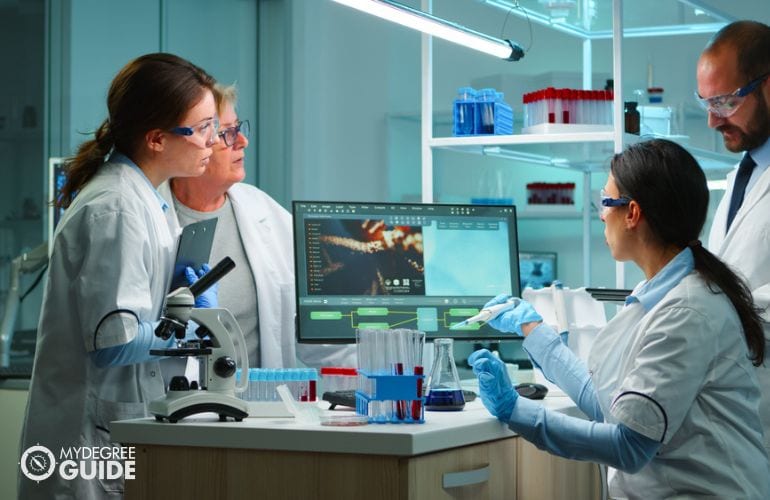
Biochemistry is an innovative scientific field that combines biology and chemistry. Experts in this field investigate the chemical and physicochemical processes that take place inside humans, animals, plants, and microorganisms. Biochemistry has many applications, from curing diseases to increasing food safety.
Editorial Listing ShortCode:
Earning a bachelor’s degree in biochemistry can help prepare you for entry-level roles or graduate studies in biotechnology, medicine, scientific research, and other rewarding areas.
Universities Offering Online Bachelors in Biochemistry Degree Programs
Methodology: The following school list is in alphabetical order. To be included, a college or university must be regionally accredited and offer degree programs online or in a hybrid format.
Arizona State University
Arizona State University offers an online program for a Bachelor of Science in Biochemistry. Students may come to the ASU campus for a week to complete lab experiences or take labs at an approved college or university near where they live. Each course in the program is 7.5 weeks long.
ASU is accredited by the Higher Learning Commission.
Florida International University
Florida International University offers a Bachelor of Arts in Biological Sciences that can be earned online. Potential courses include Scientific Literacy, Cellular Chemistry, and Ecology. Each online student is paired with a success coach to provide one-on-one assistance. Applications are accepted for the fall, spring, and summer.
Florida International University is accredited by the Southern Association of Colleges and Schools Commission on Colleges.
Life University
Life University’s online Bachelor of Science in Biology program can help prepare students for many career and education options. The program consists of 188 quarter credit hours of courses. Potential courses include Experimental Design and Analysis, Principles of Genetics, Immunology and Disease Patterns, and Cell, Neural, and Muscle Physiology.
Life University is accredited by the Southern Association of Colleges and Schools Commission on Colleges.
Logan University
Logan University offers an online program for a Bachelor of Science in Human Biology. It provides opportunities to study under top researchers and be part of a supportive learning community. Graduates of the program often attend graduate or professional schools in healthcare or related fields. Logan uses a trimesterly academic calendar.
Logan University is accredited by the Higher Learning Commission.
National University
In the National University’s Bachelor of Science in Biology program, each course is just 4 weeks long to help students earn their degree faster. The program is mostly online, with some requirements on campus in San Diego. Common topics of study include ecology, genetics, and evolution.
National University is accredited by the WASC Senior College and University Commission.
Oregon State University
Oregon State University offers an online program for a BS in Biohealth Sciences. The program uses a quarterly calendar, with four start dates every year. All courses are taught by the same instructors who teach on campus. A wide range of elective options is available to allow students to better tailor the program to suit their own interests.
Oregon State University is accredited by the Northwest Commission on Colleges and Universities.
University of Arizona
Graduates of the University of Arizona’s BS in Biology program have a high success rate in gaining admission to graduate and pre-professional programs. Coursework can be completed online, but students are required to come to campus during the summer for labs. Potential courses include Genetics, Ecology, and Foundations in Biochemistry.
The University of Arizona is accredited by the Higher Learning Commission.
University of Florida
The University of Florida offers an online program for a Bachelor of Arts in Biology. The program aims to provide a high level of flexibility but the same academic rigor and instructional quality that can be found on campus. The curriculum emphasizes real-world problem-solving.
The University of Florida is accredited by the Southern Association of Colleges and Schools Commission on Colleges.
University of Maryland Global Campus
The University of Maryland Global Campus offers a BS in Biotechnology. All courses are available online, but the program does require a workplace learning experience. The curriculum was designed in consultation with industry experts to help ensure students graduate with in-demand knowledge and skills.
The University of Maryland Global Campus is accredited by the Middle States Commission on Higher Education.
University of North Texas
The University of North Texas offers a BS in Biomedical Sciences. This online program is designed to be flexible and convenient, with classes taught by knowledgeable instructors. This is a degree completion program intended for those who have already earned at least 60 undergraduate credit hours.
The University of North Texas is accredited by the Southern Association of Colleges and Schools Commission on Colleges.
Online Biochemistry Degrees

Biochemists study biological and chemical processes that occur on cellular and molecular levels. This interdisciplinary field draws on chemistry, immunology, molecular biology, physics, and other branches of science.
As a biochem major, you can analyze the molecular structure of living cells and study how complex biochemical processes affect organisms. For example, a biochemist could examine how an experimental prescription medication causes chemical reactions in tissues. Other popular uses for biochemistry include creating healthier foods, developing vaccines, and evaluating the safety of pesticides.
You can expect to study a range of intriguing scientific subjects while completing a biochemistry bachelor degree, such as:
- Biomolecular engineering
- Biophysical chemistry
- Cell Biology
- Computational genomics
- Genetics
- Materials Chemistry
- Neurobiology
- Nuclear chemistry
- Organic chemistry
- Physical chemistry
- Recombinant DNA
Many programs require students to complete labs and research projects under faculty supervision. You could also participate in an internship. These hands-on learning experiences enable you to hone your skills and may help you stand out to potential employers.
A Bachelor of Biochemistry online degree program can help prepare you for careers in various industries. Here are a few potential job titles that a biochem major might pursue:
- Agricultural scientist
- Biochemist
- Biological technician
- Chemical technician
- Clinical laboratory technician
- Food researcher
- Forensic science technician
- High school teacher
Many students choose to enroll in graduate school or a professional program after completing a bachelor’s degree in biochemistry. For instance, some build on their biochemistry knowledge by studying to become a dentist, microbiologist, patent lawyer, pharmacologist, or veterinarian.
A biochemistry degree can also prepare you for a career in academia. Some students continue their education by completing a PhD in Biochemistry. This advanced degree may help you qualify for a position as a college professor or a biochemist in research-and-development roles.
Majoring in biochemistry can allow you to pursue numerous career paths across many industries. If you have a passion for science and want a versatile degree, a bachelor’s in biochemistry could be beneficial.
Biochemistry Careers & Salaries
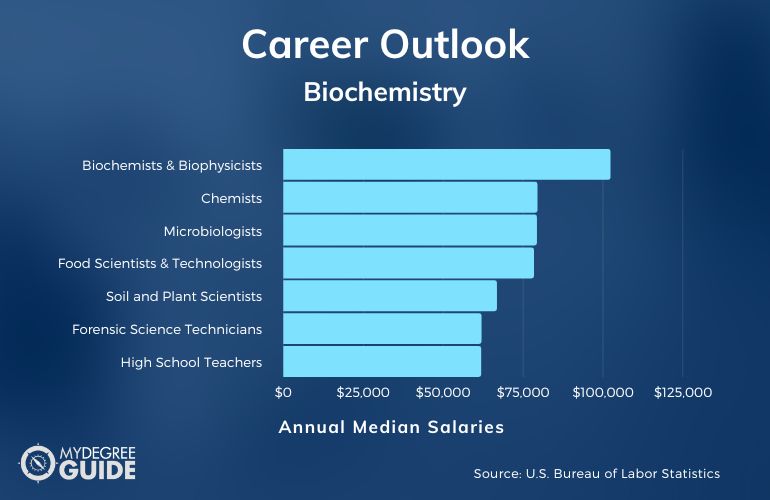
An online biochemistry degree can help you launch or advance a career in many different areas. Some biochemistry majors want to conduct research and perform experiments in laboratories. You might find these positions at biotech startups, chemical manufacturers, cosmetics companies, colleges, pharmaceutical manufacturers, and other organizations.
Other biochemistry majors pursue careers in the healthcare industry. They may work as a clinical laboratory technician in a blood bank, hospital, medical laboratory, or physician’s clinic.
According to the Bureau of Labor Statistics, here are some potential positions related to the study of biochemistry.
| Careers | Annual Median Salaries |
| Biochemists and Biophysicists | $102,270 |
| Chemists | $79,430 |
| Microbiologists | $79,260 |
| Food Scientists and Technologists | $78,340 |
| Soil and Plant Scientists | $66,750 |
| Forensic Science Technicians | $61,930 |
| High School Teachers | $61,820 |
| Clinical Laboratory Technologists and Technicians | $57,800 |
| Chemical Technicians | $48,990 |
| Biological Technicians | $48,140 |
A bachelor’s degree may help you qualify for entry-level roles in biochemistry, but a PhD is required for biochemists in independent research-and-development roles.
Some biochem majors go on to complete graduate or professional degrees to become dentists, doctors, epidemiologists, medical scientists, or veterinarians. These professionals often work in clinics, hospitals, and government agencies. Additionally, a biochemistry professional may enter the education industry. Some graduates secure positions as high school biology or chemistry teachers.
Teaching jobs may require state licensure. Salaries depend on many factors, including your employer, location, and years of work experience. Completing a graduate degree or earning a relevant certification may boost your earning potential.
BS in Biochemistry Curriculum & Courses
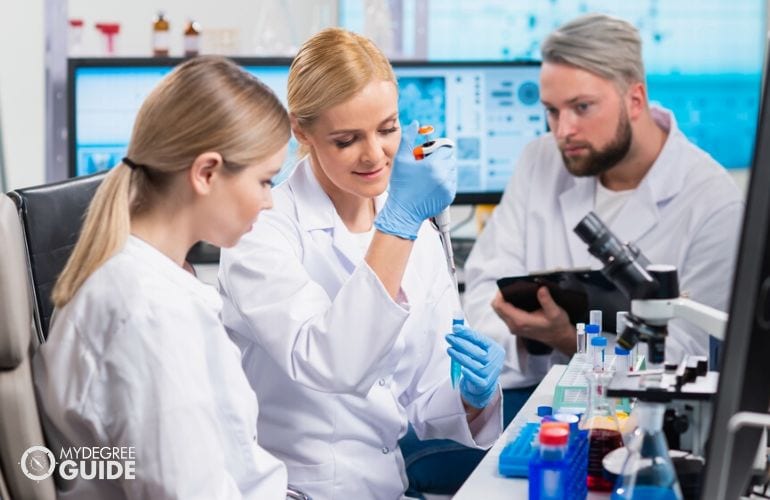
Every bachelor’s in biochemistry program has a unique curriculum, but here are a few examples of classes you may take:
- Biochemistry: This introductory course covers fundamental concepts of biochemistry, with a focus on bioenergetics, intermediary metabolism, and the structures of compounds like lipids and proteins.
- Developmental Biology: You’ll use evolutionary biology concepts to investigate the complex gene hierarchies that influence animal development.
- General Chemistry: This course provides an overview of the basic principles of chemistry, such as atomic structure, chemical equilibrium, and stoichiometry.
- Introductory Genetics: You’ll learn foundational genetics concepts and theories, including chromosome mapping, cloning, gene transmission, and mutations.
- Molecular Genetics: You’ll study foundational concepts in molecular biology, including genetic repair, the structure of DNA and RNA, and DNA replication.
- Neuropharmacology: This course examines how drugs alter the brain on the molecular level and investigates how drugs can treat psychiatric and neurological disorders.
- Organic Chemistry: You’ll analyze the interrelationships and properties of major organic compounds and conduct laboratory experiments.
- Physical Biochemistry: This class teaches methods to study the physical properties of biological molecules, including magnetic resonance techniques and X-ray diffraction.
- Techniques in Biochemistry and Biotechnology: You’ll learn approaches to biochemical experimentation, including carbohydrate analysis, immunoassays, and protein purification.
- Virology: You’ll study viruses affecting animals and plants and learn about their genome organization, reproduction, and impact on living organisms.
Many biochemistry programs also require students to take general education courses in the liberal arts, mathematics, and statistics.
Biochemistry Bachelors Admissions Requirements

The process of applying for biochemistry programs varies by school, but here are a few typical materials you may be required to submit:
- Application fee. Many colleges require you to pay a fee when you submit your application. Some schools offer fee waivers for eligible students.
- Personal statement. This essay describes your reasons for pursuing a biochemistry major and your career goals.
- Resume. This document provides an overview of your education, skills, and relevant work experience.
Some schools may ask you to submit ACT or SAT scores, but many colleges have eliminated this requirement.
Accreditation
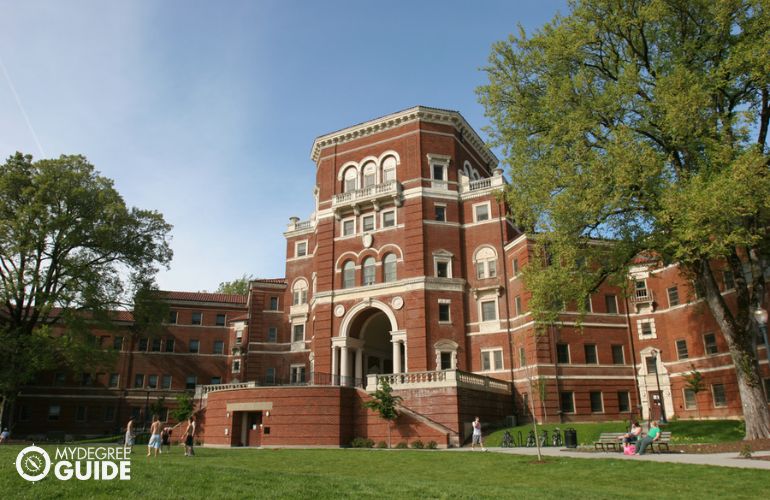
When researching biochemistry bachelor’s programs, you’ll likely encounter regionally accredited schools. Colleges and universities can earn accreditation after proving that they meet academic quality standards set by an external accrediting organization.
Selecting a regionally accredited school offers several benefits. Many financial aid opportunities, such as federal aid, are only available to students attending accredited schools. Additionally, graduate schools often only recognize course credits from accredited colleges.
Attending an accredited school could also boost your marketability to employers. Companies often prefer to hire graduates from accredited programs. You can visit the US Department of Education’s website to learn more about accreditation.
Biochemistry Majors Financial Aid and Scholarships

You may be eligible for financial aid opportunities that can reduce the cost of your online biochemistry degree. Popular forms of financial aid include grants, scholarships, and student loans.
Many colleges offer merit- and need-based grants and scholarships for eligible students. You may also qualify for an on-campus job funded by a federal work-study program. You can determine your eligibility for need-based aid by completing the Free Application for Federal Student Aid (FAFSA). Federal and state governments can also provide financial aid through grants and scholarships.
In addition, the federal government offers subsidized student loans that frequently have lower interest rates than private loans. Some companies offer tuition assistance or reimbursement programs for current employees. You may also be eligible for scholarships from community organizations and professional associations.
What Is a Biochemistry Major?
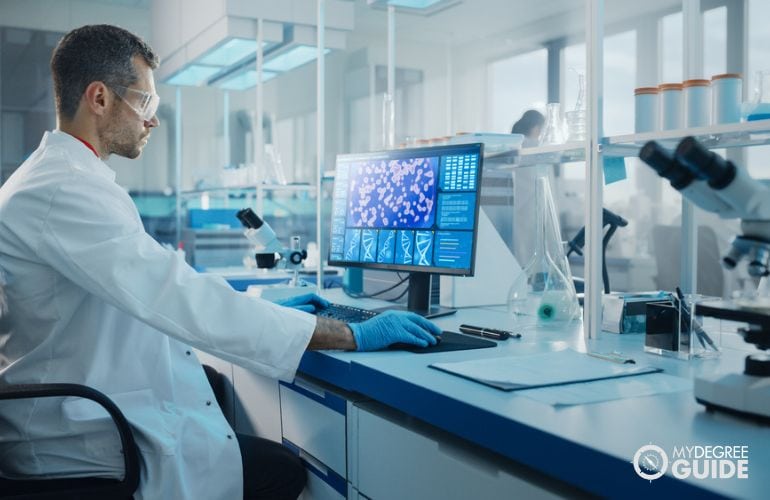
A biochemistry major is a bachelor’s degree that combines scientific disciplines like biology, chemistry, and physics. This degree allows you to investigate how complex chemical compounds and processes influence organisms.
This major requires students to take extensive coursework in the sciences. For example, you may take classes on diverse subjects like applied chemistry, molecular biology, and pharmacology. You could also have the opportunity to complete a capstone project and participate in an internship.
A biochem major can qualify for entry-level positions in many industries, such as biotechnology, cosmetics, education, food science, and healthcare.
Is Biochemistry a Hard Major?

Biochemistry has a reputation for being challenging, but the difficulty level for any major is subjective. Students who pursue a bachelor’s degree in biochemistry take many foundational and advanced science courses.
Biochemistry programs typically require students to study complex topics like biophysical chemistry, cell biology, microbiology, organic chemistry, and thermodynamics. You can sharpen your scientific skills by completing laboratory components for each subject.
Many biochemistry programs also require students to gain hands-on experience through capstone projects, extracurricular activities, and internships. If you have a passion for science, you might be interested in the study of biochemistry.
What Can You Do with a Biochemistry Degree?
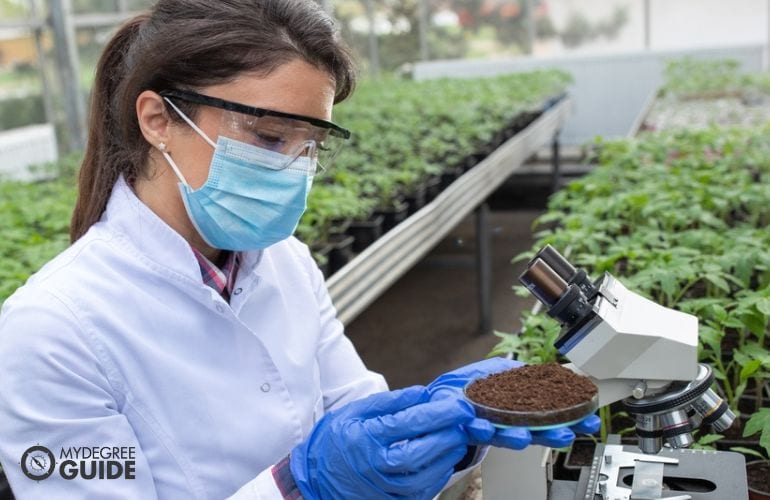
Graduates with a biochemistry bachelor degree can work in a variety of roles. Many professionals secure research positions at biotech companies, colleges, corporations, and government agencies.
For example, biochem majors may work as biological or chemical technicians, clinical laboratory technicians, or entry-level biochemists. Other students expand their scientific knowledge by pursuing graduate and professional degrees. You might enroll in a physician assistant program or apply for dental, law, or medical school.
Biochem majors may also go on to earn on-campus or online masters in biochemistry, epidemiology, molecular biology, and other scientific fields. A biochemistry professional may also teach high school science classes or work as a science educator.
A number of universities now offer masters in biochemistry or masters in genetics online and on-campus programs.
How Long Does It Take to Get a Bachelor in Biochemistry Degree Online?

The length of a biochemistry program can vary based on the school’s academic schedule, enrollment status, and other factors. If you enroll full-time in a program with traditional 16-week semesters, you can generally complete your bachelor’s degree in 4 years. Taking summer classes may reduce the time it takes you to graduate.
Much like with an online degree in biology, many online biochemistry degree programs allow students to enroll part-time. This option can extend the length of your studies, but it may enable you to balance your studies more easily with family or work commitments.
What’s the Difference Between a Bachelor Degree in Biochemistry vs. Chemistry?
If you’re choosing a major, you may wonder about the differences between biochemistry and chemistry degrees. Here’s a quick comparison.
| Bachelors Degree in Biochemistry | Bachelors Degree in Chemistry |
|
|
Your career aspirations and interests can help determine which degree path is best for you.
Is a Bachelors in Biochemistry Degree Worth It?
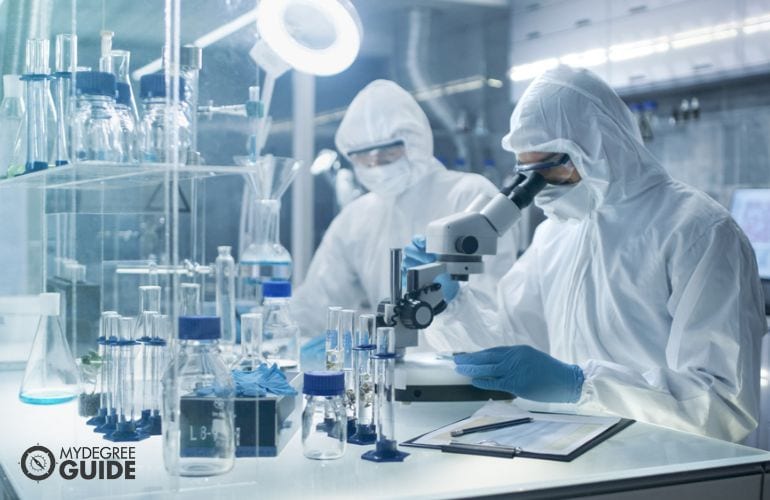
Yes, a bachelors in biochemistry degree is worth it for many students. This degree allows you to investigate the inner workings of living organisms.
You can study a broad range of fascinating topics, like applied chemistry, gene sequencing, and immunology. This major can prepare you for many growing and rewarding careers in education, medicine, and research. Potential career paths in the field include clinical laboratory technician, microbiologist, agricultural or food scientist, and biological or chemical technician, just to name a few options.
A bachelors can also help you prepare for graduate studies or entry-level biochemist roles. According to the Bureau of Labor Statistics, 7% of job growth is projected for life, physical, and social science occupations over the next ten years.
Getting Your Biochemistry Bachelor’s Degree Online

If you have a deep love for science, you might consider pursuing a biochemistry bachelors degree online. This interdisciplinary major lets you gain knowledge of many fascinating subjects, including biology, chemistry, and physics.
You’ll learn fundamental concepts and practical applications for these disciplines. A bachelor biochemistry degree can help unlock numerous career opportunities spanning many industries. You might help develop new biotech products, find a cure for a genetic disease, or create life-saving vaccines.
Why not start your educational journey by checking out accredited online biochemistry programs today?
